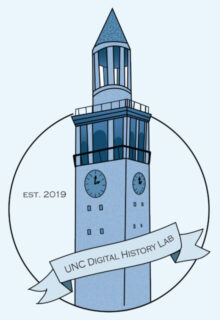UNC History Community,
Thank you to everyone that came out yesterday for the working group meeting! We enjoyed hearing about your pursuits in the digital humanities and exploring the digital project Queerolina.
Here are a few new and interesting Digital History stories for the week:
- Queerolina: UNC History Graduate Student Hooper Schultz (he/him) and UNC SILS Student Cassie Tanks (she/hers) (MA 2022) worked with the Southern Oral History Program, the University Archives at Wilson Library, and the Carolina Pride Alumn Network to create this amazing exhibit on LGBTQIA+ experiences on UNC over the years. The site provides an interactive map of UNC’s campus (and beyond) as well as clips from oral histories Schultz and Tanks conducted over the course of the project. Check it out here.
- Slavery & UGA: As part of a larger, national initiative to analyze and share the history of enslavement at universities, the University of Georgia has created a new digital project. Through the use of primary sources, UGA libraries and archives aim to “…expose the relationship between the University and enslaved individuals on campus” up until 1865. You can find out more about “On These Grounds: Slavery and the University of Georgia” here.
- Women Film Pioneers Project: In modern texts on film history, attention is often given exclusively to male actors, screenwriters and directors. Film Scholar Jane Gaines at Columbia University sought to change this narrative through her digital project “The Women Film Pioneers Project.” The website presents “…short career profiles on single individuals, longer thematic peer-reviewed overview essays, and shorter multimedia posts, all by film scholars, film curators, archivists, and historians.” Take a look at the project here.
- Digital Preservation Framework: The National Archives and Records Administration recently published information on “publishing data in a machine-readable way that allows it to be connected and enriched through links to directly related resources published by other organizations.” This includes over fifty years of digital preservation practices and tips on how to maintain archives of outdated technology. Learn more about digital preservation here.
Make sure to contact the Digital History Lab if there are any skills you want to learn, need support with your own digital history projects, or are interested in our podcast!
Thanks for reading,
The DHL Team (Cameron, Dustin, Madeleine & Sarah)
